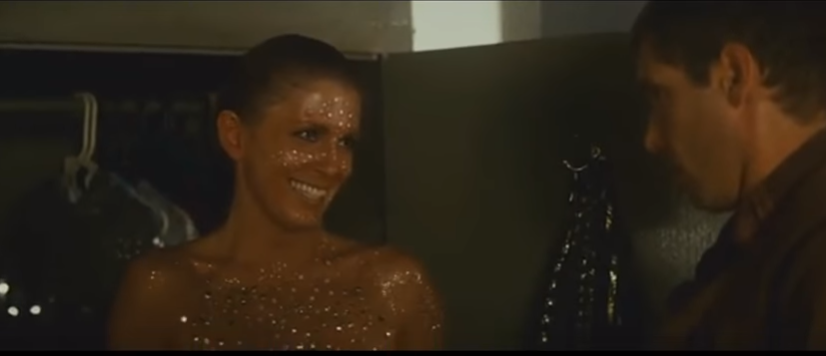When I first saw this question, my immediate response was that Zhora's question was not supposed to have any particular significance—that it was just her expressing her surprise and exasperation with Deckard. It's a pretty reasonable reaction; he does, after all, follow her into her dressing room and watch her change clothes—which she does not particularly seem to care about, but it makes Deckard seem both clueless and hypocritical.
Moreover, some the suggestions that Deckard might be more (or less) than he seems were supposedly only added by Ridley Scott at a fairly late stage, mostly in post-production. There would seem to be little reason for there to be such a suggestion in the script, if Deckard possibly being a replicant was a relatively late addition to the story.
However, I went and looked at the script, and I changed my mind. The opposite is true. That line was definitely there to provoke some thought—if not necessarily about whether the protagonist was a replicant, then about the overall theme of the ersatz-ness of practically everything in the Blade Runner future and the assumed but dubious superiority of humans over replicants.
The reason I changed my mind is that the shooting script actually has the scene play out slightly differently.
DECKARD: Like to get this job... did you or were you asked to do anything lewd or unsavory or otherwise repulsive to your person?
SALOME: Are you for real?
DECKARD: Oh, yeah. You'd be surprised what goes on around here. I'd like to check the dressing room if I could.
SALOME: What the fuck for?
DECKARD: For holes.
This guy might be an asshole, but he's funny.
SALOME: I don't believe this.
She shrugs and they go in.
INT. DRESSING ROOM — NIGHT
Musty, cramped. A portable shower, a dressing table and not much else. On the dressing table lies a snake. Deckard watches it undulate into the warmth of the lights.
DECKARD: Is that mother for real?
SALOME: Of course he's not real. You think I'd be working here if I could afford a real snake?
Besides some reordering of the scene, the script seems to envision the setting as even significantly more tawdry than what actually appears in the movie. (For example, Deckard soon finds that there actually is a peephole in the dressing room.) More important here, however, is the repetition in Deckard's question about the snake: "Is that mother for real?" The similar phrasing, although the apparent meaning of "for real" is quite different between the two questions, seems very unlikely to be a coincidence. The scriptwriters, Hampton Fancher and David Peoples, almost certainly put that echo in there on purpose.
Now, as I said above, this may not have been meant to suggest specifically that Deckard might be a replicant. It may have been intended more as a thematic gesture—pointing out how practically everything in the film's dystopian setting is, to some degree, fake. Deckard himself has adopted a false persona for this very scene (a persona of which Zhora is rightfully suspicious); and there are many other examples. (J. F. Sebastian is young but seems middle aged; Gaff leaves origami facsimiles of animals to indicate his presence; Rachel does not even know whether she is "real" herself.)
In the scene as finally shot, Deckard phrases the question about the snake differently: "Is this a real snake?"
This breaks the parallel with the earlier line, but maybe Ridley Scott actually wanted to tone down the suggestiveness of Zhora's line. However, it certainly seems, from the shooting script, that the phrasing of that line was indeed intended to be suggestive of something.

